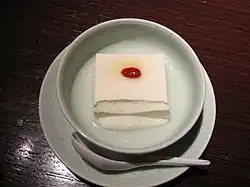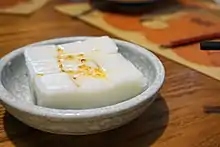 A bowl of almond tofu | |
| Alternative names | Xingren doufu, almond tofu, almond jelly, almond float |
|---|---|
| Type | Pudding |
| Main ingredients | Apricot kernel milk, water, gelling agent (usually agar) |
| Almond tofu | |||||||||||||||||||
|---|---|---|---|---|---|---|---|---|---|---|---|---|---|---|---|---|---|---|---|
| Chinese name | |||||||||||||||||||
| Chinese | 杏仁豆腐 | ||||||||||||||||||
| Jyutping | hang6 jan4 dau6 fu6 | ||||||||||||||||||
| Hanyu Pinyin | xìngrén dòufǔ | ||||||||||||||||||
| Literal meaning | apricot kernel tofu | ||||||||||||||||||
| |||||||||||||||||||
| Japanese name | |||||||||||||||||||
| Kanji | 杏仁豆腐 | ||||||||||||||||||
| Kana | あんにんどうふ | ||||||||||||||||||
| |||||||||||||||||||
Almond tofu (Chinese and Japanese: 杏仁豆腐; pinyin: xìngrén dòufǔ; Cantonese Jyutping: hang6 jan4 dau6 fu6; rōmaji: an'nindōfu) is a soft, jellied dessert made of apricot kernel milk, agar, and sugar. It is a dessert that originated in China and is now popular in neighbouring regions like Hong Kong, Japan, Malaysia, Singapore, and Hawaii. A similar dessert is French blancmange.
The name "tofu" here refers to "tofu-like solid"; soy beans, which are the main ingredient of tofu, are not used.[1] This naming convention is also seen in other East Asian dishes, such as Chinese yúdòufu (魚豆腐) and Japanese gomadōfu (胡麻豆腐). Apricot kernel milk is often confused with almond milk, as apricot kernel itself is often confused with almond.
Preparation

In the traditional recipe, the primary flavoring agent is apricot kernels, soaked and ground with water. The mixture is strained, sweetened, and heated with a gelling agent (usually agar). When chilled, the apricot kernel milk mixture solidifies into the consistency of a soft gelatin dessert.
Although the agar-based recipe is vegan, there are numerous nontraditional recipes that are not. Most are based on dairy products and a small amount of flavored extract. Gelatin is also a common substitute for agar. Annin jelly can be made from scratch or using instant mix. There is an instant soy-based powder with a coagulating agent, which dissolves in hot water and solidifies upon cooling.
In Taiwanese cuisine, the dish uses the sweeter southern variety of apricot kernels which are mixed with peanuts. In Taipei, the dessert originated as a food stall dish, but is now also served in banquets halls and hotel restaurants.[2] In Hawaii where it is commonly known as "almond float," it was introduced by Chinese immigrants starting in the 1850s, it is now usually made with gelatin and almond extract and typically mixed with canned fruit cocktail and canned lychee.[3]
See also
References
- ↑ "在家做杏仁豆腐(美食高手)". 环球时报 生命周刊 page 6. 11 October 2005. Archived from the original on 14 December 2014. Retrieved 9 December 2014.
- ↑ Crook, Steven; Hung, Katy Hui-wen (8 October 2018). A Culinary History of Taipei: Beyond Pork and Ponlai. Rowman & Littlefield. p. 66. ISBN 978-1-5381-0138-4. Retrieved 18 July 2023.
- ↑ Shimabukuro, Betty (29 Mar 2000). "Almond flavors a classic dessert". archives.starbulletin.com.
External links
- Annin tofu recipe Archived 2019-09-10 at the Wayback Machine